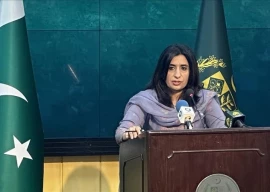
Let’s detail some of these gains: Al Qaeda has undoubtedly been weakened and is no longer a significant force in the AfPak contiguity. The flip side, however, is that al Qaeda now has its tentacles spread on newer shores: in Yemen, the Arabian peninsula, Southeast Asia, the Maghreb and also various cells reported to be presented in Europe.
It all began with George W Bush’s “smoke ‘em out” determination. Of course, no one will deny the need to commiserate with the Americans on the dastardly 9/11 tragedy, but the invasion of Afghanistan only seems to have ended up spreading al Qaeda to other regions of the world. Instead of containing it, it has been transformed into a geographically diverse movement, and one cannot rule out that it will not plan or carry out further attacks. Furthermore, the result also has been an overly indebted American economy, the threat of another recession, a fracturing polity and, all in all, a humiliating drawdown of American stock in the world. Nations pay for a long time after their leaders make poor decisions and bad choices; in the case of superpowers this is even more acute.
The next sin, and an opportunity lost, was when Barack Obama chose to stay the route in Afghanistan. He shunned Iraq because he had a choice, but never got the nerve to dump Afghanistan. He may continue to explain that to his grandchildren with grand moral overtones and religion-draped patriotic zeal, but he will find it hard to explain to his Democratic Party Caucus, how he lost the magical superiority that he and his party had achieved in the 2008 elections. Perhaps he was too weak to answer the call of his conscience and do what he always knew was the right course, but he could not appear as a wimp to the American electorate.
That meant that the US would remain embroiled in Afghanistan. Let us assume that Afghanistan’s key strategic location as a saddle amidst energy-rich Central Asia, a deviant Iran, and a nuclear and religiously polarised Pakistan, was the underlying objective. It certainly would have been a laudatory objective worthy of both time and treasure for the lone superpower of the time. There are two ways for America to entrench itself in Afghanistan to achieve any of the above interests as well as to checkmate China and Russia from making forays into the mineral-rich region. One would have been to convert Afghanistan to an entity that would mirror America and create socio-political identities that would keep both in a natural embrace — a kind of America away from America. That was not to be though; initially the US diverted its focus back to Iraq, and then when attention went back to Afghanistan, a lot of time had elapsed and the US economy was unable to support two wars at the same time. That is when the counterinsurgency mission scaled itself down to counterterrorism. As such Afghanistan hasn’t morphed into a mini-America and has not developed socio-political linkages that would have given the US a natural parking slot and pervasive presence.
The next option, and that still is very much on the cards, is to sign a strategic agreement for a prolonged presence in the country. Under this, Afghanistan would have control and ownership of military bases that the US may occupy at any time of its choosing. That would clearly need a multi-partisan acquiescence in Afghanistan and a long surviving political structure that will continue to honour the agreement. So in case there is a future coalition government in that country with a Taliban presence, this arrangement, of the US having access to bases, may not materialise.
An extended formulation of the same concept, to enable America to revisit the region at the time of its choosing, is to leave enough turmoil behind for Washington to say that it believes that its vital interests, vis-à-vis energy-rich Central Asia and strategically important Iran and Pakistan would remain threatened, and hence it would be able to invite itself to justify a prolonged presence. Even Karzai isn’t game for the longer-term bases deal and is insisting that any such proposal be decided by a loya jirga.
Hence, America’s most credible way out of the quagmire it finds itself in, is to leave a sustaining chaos behind instead of a sustained peace and a political order that will keep creating conditions where US intervention may be necessary from time to time.
Enter the Haqqanis, and America’s wrath for both Pakistan and the Haqqanis. If the Haqqanis, as the more formidable militant group, can continue to cause this region and Afghanistan to be engulfed in conflict, that should foot the bill. What better if Pakistan, too, can be coerced into taking on the Haqqanis and create a wider zone of a continuing conflict. Perhaps that may put into perspective the outbursts from America’s military and political leaders, all pinning blame in recent days on Pakistan.
It was interesting to hear an American analyst say on an Indian television channel, that all of America’s and India’s “pains” could be removed if the Pakistani military were brought under civilian control. That’s insidious: not only would they like the military to take on the Haqqanis, they would like the politicians to push the military to take on the Haqqanis, and in doing so both would be at odds with each other. That way the turmoil would be just about perfect. Add to that what goes on in Balochistan and Karachi, and you have a coalescing set of conditions inviting foreign (read American) intervention on humanitarian grounds — to ward off a possible ethnic and/or civil war (the latter threatening the safety of Pakistan’s nuclear assets).
Of course, much of this is conjecture and some may call it a conspiracy theory. In any case, it awaits the test of time. Till that happens, however, it is worth remembering that what remains supreme are interests and that altruism in global politics is a misplaced notion.
Published in The Express Tribune, September 27th, 2011.
COMMENTS (31)
Comments are moderated and generally will be posted if they are on-topic and not abusive.
For more information, please see our Comments FAQ



1730884134-0/BeFunky-collage-(26)1730884134-0-165x106.webp)




1730379446-0/WhatsApp-Image-2024-10-31-at-17-56-13-(1)1730379446-0-270x192.webp)
1730985983-0/Express-Tribune-Web-(28)1730985983-0-270x192.webp)
1730797335-0/Untitled-design-(81)1730797335-0-270x192.webp)






"Hence, America’s most credible way out of the quagmire it finds itself in, is to leave a sustaining chaos behind instead of a sustained peace and a political order that will keep creating conditions where US intervention may be necessary from time to time."
Good point Mr. Shazad. The level of criticism and response is proof enough that your conspiracy theory is credible. Good Job.
When The United States went after the ruthless dictator in Iraq, did not the pundits say with authority that the United States is there for oil and now will have permanent bases forever? Were both claims not proven wrong? Today we have drawn down to only a few thousand non-combat troops, who are ready to come out of Iraq soon. The oil fields are also not under United States; they are being operated by Kuwaiti and Chinese companies. The same applies in Afghanistan. Afghanistan was in shambles, plundered by warring war-lords and the Taliban. The United States has helped stabilize Afghanistan. The Afghan security forces are taking a more commanding position and flushing out the terrorists. The new democracy is striving to keep all factions working together for a better and stable Afghanistan. It is in the interest of the United States that Afghanistan remains stable, and that is the reason we are asking Pakistan to neutralize the Haqqanis, who are part of the Taliban and operate from Northern Pakistan.
Do you not agree that a stable Afghanistan will help Pakistan prosper and make the region safer and free of terror? Is it not in our interest that this happens? We have no desire to stay in Afghanistan even a day longer than necessary. We are there to make this world a little safer so that terrorists are not able to make safe havens for themselves. Doesn’t instability invite trouble-makers to exploit the situation? Did Al-Qaeda not do that? If we want peace to prevail in the region, we need to work together to eliminate terrorism so our children inherit a safer and prosperous planet from us.
The real trajedy is you people don't realize how vulnerable you are. If the United States Treasury stops all money transers to Pakistan, the economy will crumble in about a week. All the bravado about not needing IMFand WB will end overnight, it is that simple. Funny it can be done by the Treasury Secretary. I am not saying it is going to happen but just pointing out how vulnerable Pakistan is.
@ Andamani
Allegation by whom? The same US intellegence agencies who found evidence of Weapon of Mass Destruction (WMD) in Iraq and provided justification for invasion of Iraq? If you dont want to trust pakistan for it lies, how can you trust US for its truths?
@Santosh
Exactly. But the constitution of Pakistan says alot of other things as well for civilian govt. what about that? What about the honesty and sincerity and incorruptibility of the civilian leadership which the constitution demands?
@Andamani:
Finding Osama in Abbotabad is same as when they found WMD's in Iraq. We all saw proofs of both the claims, right??? Haqqani was supported by CIA and ISI together not too long ago. CIA took a U turn, ISI did not, big deal. Both ISI and CIA have different priorities. There is no "Moral values" involved here, just priorities. Where is the moral justification in supporting warlords and drug lords in Afghanistan, who have committed similar human rights abuses same as the Taliban, just on a different pretext.
:Information for Bannya and Yank Lackeys The Obama administration is considering placing the Haqqani network on its list of terror groups after blaming the militants for deadly attacks in Afghanistan, a US official said Monday. They are still not terrorists as per the official position of USA and they want them eliminated by Pakistan, so that it can become a human rights issue in the next blame game. http://tribune.com.pk/story/261431/us-weighs-blacklisting-haqqani-network/
In the entire Air marshal’s analysis I was hoping that he would somewhere highlight the “strategic” choices for the people of Pakistan. What comes out is that we are being again asked to relegate ourselves to being expendables and resign our lot to America’s evil machination. When will our pseudo strategist give importance to the people of Pakistan? Why is it that among the so many neighbors of Afghanistan we are the only country so destructively affected by events in that country? Why is it that we have to wait for Americans to leave Afghanistan before we can sort our house? When are we going to grow up and able to fend for ourselves? Is there no other choice?
@John B: Than you for your concern. Whats the next point???
Sir don't be afraid of propaganda tools such as "Conspiracy Theory" or "Conjecture", I don't understand what's the difference between rational & logical geo-political analysis and "Conspiracy Theory", perhaps no country will say what their real objective or motive is or how they would like to benefit from on going crisis.
So you will find "mainstream media" pundits putting down any logical or rational analysis that oppose "official theories" as "Conspiracy Theory", this is one of the great new fruit given to us by "War of Terror"!
"Of course, much of this is conjecture and some may call it a conspiracy theory."
....at least this Estalishment man acknowledges that he spins conspitracy theories!!!
The author has penned an unconvincing piece. The Air Vice Marshall is highlighting that the Afghan war has brought America in to economic recession and in the same breath he is saying that Americans want to create chaos in Afghanistan so that they can intervene there in future. If the Americans are in such economic dire straits then logically they would want peace in Afghanistan as soon as possible rather than the other way round. Only the delusional Pakistanis believe that the Americans are so tightly straight-jacketed in Afghanistan that they will have no other option but to dance to the Pakistani tunes. Pakistan should wake up and understand that even if Americans leave in 2014, there will surely be permanent American led NATO bases in Afghanistan. The world has no appetite to re-witness a medieval style brutal Talibani rule in Kabul. Pakistani dreams of ruling Afghanistan via their Talibani proxies will never materialize.
@Farrukh Siddiqui
Pakistani Government or local private companies do not have the finances or technology to construct a pipeline. And why wouldn’t US get rights for exploration for its own companies and build a pipeline to earn large revenues. It didn’t put pressure on Pakistan to give way for a pipeline. The conflict was between UNOCAL and Bridas, a rival company; US asked Benazir to sign contract with UNOCAL instead of Bridas. US-China bilateral trade is worth 400 billion dollars; they are not enemies. US won’t spend trillion of dollars on an attack on Baluchistan just to prevent China from using Gawadar as port. Sectarian violence in Pakistan is mainly financed by Saudi Arab, an arch enemy of Iran. US doesn’t want any country to develop ties with Iran because of its nuclear ambitions. But Iran and Pakistan also have their own problems. Both waged proxy wars in Afghanistan; Taliban backed by Pakistan and Northern Alliance backed by Iran were locked in deadly civil war during the 90s. And Saudi Arab has major influence on our policies and prevents us from seeking better relations with Iran.
This a roundabout way of promoting: 1) military operating outside of all civilian control. How cute to argue that if the military answered to the civilians , it would create instability! 2) active support to our strategic "assets" so that we can control Afghanistan and pressure India in IOK. 3) conspiracy theories so as to preserve the primacy of the military.
Haqqanis/Taliban/LET etc are all part of the same 'jihadi' block. The ISAF/USA can eliminate them, provided we stop funding and arming these groups. These groups seek to destroy us first and foremost. But military - even ex, would rather settle grudges with USA and our neighbours.
This report from the Open Society Foundations examines how the recent, dramatic increase in night raids by international forces has affected Afghan civilians and fueled even deeper hostility towards such operations. Broader targeting strategies have put more civilians in harm’s way, as have mass, indiscriminate detentions of civilians, leaving Afghans feeling increasingly caught between the two sides of the conflict. Civilian casualties, detentions, cultural offense, property destruction, and lack of accountability continue to provoke popular and political blowback that risks seriously undermining relations with the Afghan government as well as the international community’s long-term security and political goals. http://www.soros.org/initiatives/washington/articles_publications/publications/the-cost-of-kill-capture-impact-of-the-night-raid-surge-on-afghan-civilians-20110919 The Cost of Kill/Capture: Impact of the Night Raid Surge on Afghan Civilians
US presence in Afghanistan is as certain as it is in S. Korea. Afghanistan will continue to receive economic support for humanitarian and political reasons, and PAK will be ignored. In the next 10 years growth of Afghanistan and decline of PAK economy is inevitable. PAK proxy war in Afghanistan will continue until PAK exhausts herself.
PAK will continue to receive US aid for humanitarian assistance, but her military assistance from US will be under jeopardy.
Alternatively, the increased US-PAK cold war will create a disorder in civilian administration, ultimately leading to once again PAK army control of PAK establishments. But at that time PAK army has to fend for herself.
PAK is skating on thin ice at this moment. PAK will be become a migraine, as Ms. Albright put it.
Let’s look at another prospect; America's main target was/is and will always be Iran NOT Pakistan or Afghanistan especially when the defiance Iranian government is the ONLY government with OIL and Gas sources not controlled by the US or any other western country. All US need is Iran, and having bases on the Pakistani soil makes it much easier for the US to monitor and attack (in case) Iran. Pakistan’s recent visits to Iran to increase its collaboration in the energy sector and of course the pending Gas line project are the main reason for US’s fury. Saudia on the other hand, will be ONLY serving the US mission and try to negotiate with Pakistani government for the reconciliation. The possible conditions could include NOT having any energy deal and Gas pipe line project with Iran. Let’s see how Pakistan military and civil government deal with this pressure
Pakistan should know that they are no more wanted in Afghanistan. To control Afghanistan from Islamabad is no more possible. Pakistan should take control of its military and should reject all terrorists’ organizations including Haqqani as these terrorists are hurting Pakistan more than hurting America or India. The military's obsession for the strategic depth is a hindrance to the stability in the region
Hey, hang on a second please Mr retired Air Vice Marshal/ Defence Analyst: What is so insidious about asking that "Pakistani military [be] brought under civilian control".
There have been innumerable Pakistanis who asking for the very same thing for several decades.
Shouldn't the two hundred million or citizens (through their representatives) be masters of their country's relations with neighbouring countries? What gives the right to a bunch of uniformed state employees to dictate our foreign policy? Who empowered them to make these decisions on our behalf?
in depth analysis of Pakistan current situation
http://pioussluts.wordpress.com/2011/09/26/how-long-can-china-and-saudi-arabia-go-to-protect-isi-and-pakistan/
Yes, Air Marshal, you do have a brilliant knack to conjecture. The conspiracy theory approach, too, is quite familiar; it is now ingrained in the national psyche. Without exonerating the US for its many follies and missteps it is most appropriate to question the role of your former employers i.e., the Pakistan military in bringing Pakistan to a total state of collapse and failure. The military has performed abysmally in each one of the wars it fought, it then played a shameful role in the killing of all democratic traditions and promoted the "Saudization" of society. So please do not carry on with this deceptive charade. It is time to look at your own face in the mirror. Pakistan today is a bankrupt country because of the huge amounts spent on defence expenditures. What have the generals done for Pakistan? And how much harm has the military caused to Pakistan?
@Faraz Please do not mind but you probabl need to get familiar with recent history. One of the biggest gas reserves are in Turkeminstan. The US wants Pakistan to build a gas pipeline from Turkeminstan and through Iran. For the same reason, its oil company UNOCAL put pressure on Benazir in the 1990s. The US is opposed to the Chinese access to Gwadar port. It is opposed to friendly relations between Iran and Pakistan. Hence it has used Jundullah to create trouble both in Iran and Pakistan. See this report by ABC News http://abcnews.go.com/blogs/headlines/2007/04/abcnewsexclus/
It is surprising that Pakistani analysts for some odd reasons conclude that Karzai may be disinterested in the long term US presence in Afghanistan. Karzai is now on the defensive his power base is diminishing. He has to do a balancing act between Pashtun interests represented by the Taliban with the Tajik, Uzbek and Hazara interests. And the non Pastun ethnic groups will definately want some US presence to reassure them.
Someone please find these retired servicemen something productive to do in life instead of ranting and playing boogeymen on TV & paper all day. PESA and their ilk surely have the most imaginative and ludicrous "strategic analysis". Says much about their calibre and we can estimate their uniformed performance too.
Oh wow! Lets assume this, lets assume that...All a bunch of unsubstantiated hot air which feeds our own paranoia and nothing else.
What do you mean stop China and Russia from accessing mineral rich central asia? Been hearing this for the last decade. Have you been following the news? China has already crisscrossed the region with rail networks and pipelines and so has Russia. 1990s US pipeline plans of companies now defunct doesnt mean that they are still checkmating them in the region.
Mini America hodge podge. You think the Afghan people would rather allie themselves with Pakistan instead, with nothing to offer but a stagnant economy and a national elite which treats her like a colony? Really, where do you come up with all of this from!!!
Oil/gas pipelines cannot pass through countries wrecked by perpetual civil war. Firstly, it would require decades of peace to convince companies to build pipelines across Afghanistan. And secondly, we would love to have pipelines passing through Baluchistan carrying oil from Central Asia. What problem could we have with such investments? US would get nothing by occupying Karachi or Baluchistan.
Wow lots of analysis of everything except the main topic: the allegations that the ISI supports the Haqqani network as an extension of Pakistani policy. Sir still waiting for you to address the main point rather than rehashing widely known history and geography. Also please explain Osama's Abbottabad holiday while you're at it.